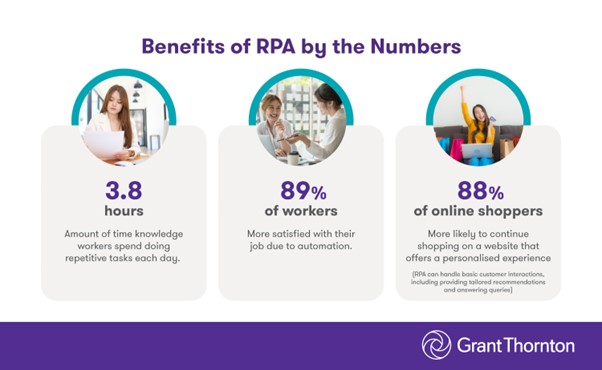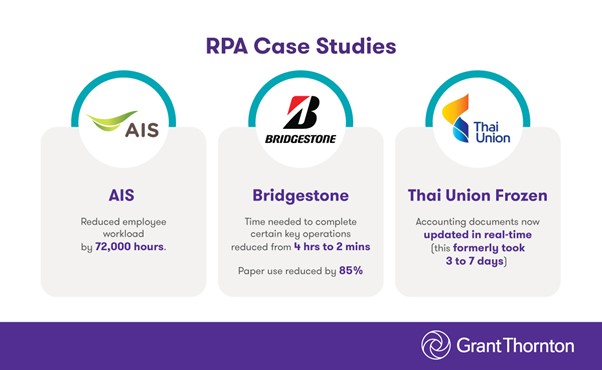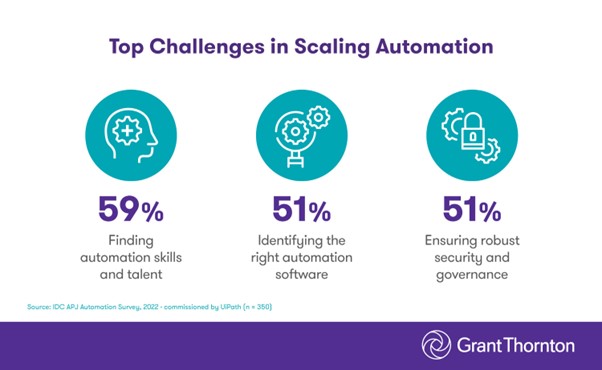-
Internal audit
In today's increasingly competitive and regulated market place, organisations - both public and private - must demonstrate that they have adequate controls and safeguards in place. The availability of qualified internal audit resources is a common challenge for many organisations.
-
IFRS
At Grant Thornton, our International Financial Reporting Standards (IFRS) advisers can help you navigate the complexity of financial reporting so you can focus your time and effort on running your business.
-
Audit quality monitoring
Having a robust process of quality control is one of the most effective ways to guarantee we deliver high-quality services to our clients.
-
Global audit technology
We apply our global audit methodology through an integrated set of software tools known as the Voyager suite.
-
Looking for permanent staff
Grant Thornton's executive recruitment is the real executive search and headhunting firms in Thailand.
-
Looking for interim executives
Interim executives are fixed-term-contract employees. Grant Thornton's specialist Executive Recruitment team can help you meet your interim executive needs
-
Looking for permanent or interim job
You may be in another job already but are willing to consider a career move should the right position at the right company become available. Or you may not be working at the moment and would like to hear from us when a relevant job comes up.
-
Practice areas
We provide retained recruitment services to multinational, Thai and Japanese organisations that are looking to fill management positions and senior level roles in Thailand.
-
Submit your resume
Executive recruitment portal
-
Update your resume
Executive recruitment portal
-
Available positions
Available positions for executive recruitment portal
-
General intelligence assessments
The Applied Reasoning Test (ART) is a general intelligence assessment that enables you to assess the level of verbal, numerical reasoning and problem solving capabilities of job candidates in a reliable and job-related manner.
-
Candidate background checks
We provide background checks and employee screening services to help our clients keep their organisation safe and profitable by protecting against the numerous pitfalls caused by unqualified, unethical, dangerous or criminal employees.

-
Capital markets
If you’re buying or selling financial securities, you want corporate finance specialists experienced in international capital markets on your side.
-
Corporate simplification
Corporate simplification
-
Expert witness
Expert witness
-
Family office services
Family office services
-
Financial models
Financial models
-
Forensic Advisory
Investigations
-
Independent business review
Does your company need a health check? Grant Thornton’s expert team can help you get to the heart of your issues to drive sustainable growth.
-
Mergers & acquisitions
Mergers & acquisitions
-
Operational advisory
Grant Thornton’s operational advisory specialists can help you realise your full potential for growth.
-
Raising finance
Raising finance
-
Restructuring & Reorganisation
Grant Thornton can help with financial restructuring and turnaround projects, including managing stakeholders and developing platforms for growth.
-
Risk management
Risk management
-
Technology & Digital Services
Technology Services
-
Transaction advisory
Transaction advisory
-
Valuations
Valuations
-
Human Capital Consulting
From time to time, companies find themselves looking for temporary accounting resources. Often this is because of staff leaving, pressures at month-end and quarter-end, or specific short-term projects the company is undertaking.
-
Strategy & Business Model
Strategy & Business Model
-
Process Optimisation & Finance Transformation
Process Optimisation & Finance Transformation
-
System & Technology
System & Technology
-
Digital Transformation
Digital Transformation
-
International tax
With experts working in more than 130 countries, Grant Thornton can help you navigate complex tax laws across multiple jurisdictions.
-
Licensing and incentives application services
Licensing and incentives application services
-
Transfer pricing
If your company operates in more than one country, transfer pricing affects you. Grant Thornton’s experts can help you manage this complex and critical area.
-
Global mobility services
Employing foreign people in Australia, or sending Australian people offshore, both add complexity to your tax obligations and benefits – and we can guide you through them.
-
Tax compliance and tax due diligence review services
Tax compliance
-
Value-Added Tax
Value-Added Tax
-
Customs and Trade
Customs and Trade
-
Service Line
グラントソントン・タイランド サービスライン
-
Business Process Outsourcing
Companies, large and small, need to focus on core activities. Still, non-core activities are important, and they need to be leaner and more efficient than most companies can make them sustainably. For Grant Thornton, your non-core activities are our core business. Grant Thornton’s experienced outsourcing team helps companies ensure resilience, improve performance, manage costs, and enhance agility in resourcing and skills. Who better to do this than an organisation with 73,000 accountants? At Grant Thornton we recognise that that outsourcing your F&A functions is a strategic decision and an extension of your brand. This means we take your business as seriously as we take our own.
-
Technology and Robotics
We provide practical digital transformation solutions anchored in business issues and opportunities. Our approach is not from technology but from business. We are particularly adept at assessing and implementing fast and iterative digital interventions which can drive high value in low complex environments. Using digital solutions, we help clients create new business value, drive efficiencies in existing processes and prepare for strategic events like mergers. We implement solutions to refresh value and create sustainable change. Our solutions help clients drive better and more insightful decisions through analytics, automate processes and make the most of artificial intelligence and machine learning. Wherever possible we will leverage your existing technologies as our interest is in solving your business problems – not in selling you more software and hardware.
-
Technical Accounting Solutions
The finance function is an essential part of the organisation and chief financial officer (CFO) being the leader has the responsibility to ensure financial discipline, compliance, and internal controls. As the finance function is critical in every phase of a company’s growth, the CFO role also demands attention in defining business strategy, mitigating risks, and mentoring the leadership. We offer technical accounting services to finance leaders to help them navigate complex financial and regulatory environments, such as financial reporting and accounting standards, managing compliance requirements, and event-based accounting such as dissolutions, mergers and acquisitions.
-
Accounting Services
Whether you are a local Thai company or a multinational company with a branch or head office in Thailand you are obliged to keep accounts and arrange for a qualified bookkeeper to keep and prepare accounts in accordance with accounting standards. This can be time consuming and even a little dauting making sure you conform with all the regulatory requirements in Thailand and using Thai language. We offer you complete peace of mind by looking after all your statutory accounting requirements. You will have a single point of contact to work with in our team who will be responsible for your accounts – no matter small or large. We also have one of the largest teams of Xero Certified Advisors in Thailand ensuring your accounts are maintained in a cloud-based system that you have access to too.
-
Staff Augmentation
We offer Staff Augmentation services where our staff, under the direction and supervision of the company’s officers, perform accounting and accounting-related work.
-
Payroll Services
More and more companies are beginning to realize the benefits of outsourcing their noncore activities, and the first to be outsourced is usually the payroll function. Payroll is easy to carve out from the rest of the business since it is usually independent of the other activities or functions within the Accounting Department. At Grant Thornton employees can gain access to their salary information and statutory filings through a specialised App on their phone. This cuts down dramatically on requests to HR for information by the employees and increases employee satisfaction. We also have an optional leave approval app too if required.
-
 IBR Optimism of Thailand Mid-Market Leaders Suggests Potential Underestimation of Challenges Ahead: International Business Report, Q1 2024Bangkok, Thailand, April 2024 — The Grant Thornton International Business Report (IBR) for Q1 2024 unveils a strikingly optimistic outlook among Thailand's mid-market business leaders, juxtaposed with the looming challenges that will shape the nation's economic future. With a Business Health Index score of 13.5, Thailand outperforms its ASEAN, Asia-Pacific, and global counterparts, signaling a robust confidence that may overshadow critical issues such as demographic changes, skills shortages, and the necessity for digital advancement.
IBR Optimism of Thailand Mid-Market Leaders Suggests Potential Underestimation of Challenges Ahead: International Business Report, Q1 2024Bangkok, Thailand, April 2024 — The Grant Thornton International Business Report (IBR) for Q1 2024 unveils a strikingly optimistic outlook among Thailand's mid-market business leaders, juxtaposed with the looming challenges that will shape the nation's economic future. With a Business Health Index score of 13.5, Thailand outperforms its ASEAN, Asia-Pacific, and global counterparts, signaling a robust confidence that may overshadow critical issues such as demographic changes, skills shortages, and the necessity for digital advancement. -
 Workshop Corporate Strategy and Company Health Check WorkshopThroughout this workshop, we will delve into the life cycle of companies, examining the stages of growth, maturity, and adaptation. Our focus will extend to the current business environment, where your Company stands today, and how our evolving strategy aligns with the ever-changing market dynamics.
Workshop Corporate Strategy and Company Health Check WorkshopThroughout this workshop, we will delve into the life cycle of companies, examining the stages of growth, maturity, and adaptation. Our focus will extend to the current business environment, where your Company stands today, and how our evolving strategy aligns with the ever-changing market dynamics. -
 Tax and Legal update 1/2024 Introducing the New “Easy E-Receipt” Tax scheme with up to THB 50,000 in Tax DeductionsThe Revenue Department has introduced the latest tax scheme, the “Easy E-Receipt”, formerly known as “Shop Dee Mee Kuen”. This scheme is designed to offer individuals tax deductions in 2024.
Tax and Legal update 1/2024 Introducing the New “Easy E-Receipt” Tax scheme with up to THB 50,000 in Tax DeductionsThe Revenue Department has introduced the latest tax scheme, the “Easy E-Receipt”, formerly known as “Shop Dee Mee Kuen”. This scheme is designed to offer individuals tax deductions in 2024. -
 TAX AND LEGAL Complying with the PDPA – A Balancing ActOrganisations must be aware of the circumstances in which they are allowed to collect data to comply with Thailand’s Personal Data Protection Act.
TAX AND LEGAL Complying with the PDPA – A Balancing ActOrganisations must be aware of the circumstances in which they are allowed to collect data to comply with Thailand’s Personal Data Protection Act.
2023: The Year of Automation
With pandemic-related work disruptions now mostly in the rear view mirror, businesses at last have a relatively clear view of what the coming months and years will bring. This clarity lets everyone — from investors and R&D teams to marketers and HR managers — chart a course forward for the post-COVID era.
But every silver lining has a cloud. Covid dramatically accelerated trends, issues and opportunities that were already bubbling under the surface before it hit. In the present case, the view that emerges is not of a smooth and straight road ahead, but rather a rough chicaning racetrack littered with obstacles and nimble competitors.


Up to this moment, businesses seeking a recovery from the COVID-induced recession have generally put longer-term projects on hold in order to focus their efforts on mitigating these challenges as they arise.
Indeed, each of the aforementioned issues appears to merit its own unique response. The push towards working from home naturally prompted companies to develop relevant adaptations within their corporate cultures and HR policies. The Great Resignation forced recruitment managers to consider values more carefully when matching new talent with potential employers. High inflation rates caused companies to recalculate their financial projections — and on down the line.
On an issue-by-issue level, these responses seem perfectly sensible. Yet by early 2023, companies across industries have increasingly turned to an alternative strategy which neatly addresses these and many other business challenges in one fell swoop.
Ironically, many organisations had already laid the groundwork for robotic process automation (RPA) before the pandemic hit, but allowed themselves to be sidetracked by the appearance of one sudden problem after another. Rather than staying the course and letting RPA deliver the benefits it had promised, business leaders found themselves instead playing whack-a-mole with each new financial squeeze, talent crisis, and market shift as it appeared.
RPA alone cannot solve these and other common business problems — but it does make them far more manageable. RPA also frees up more of your personnel to work creatively, thereby accelerating the pace of innovation and adaptation within your organisation. This ideation advantage will be of particular importance when dealing with problems that haven’t even appeared yet, as the unpredictable future unfolds.
Below, we will explain what RPA involves and how it works. We will also highlight some of the most pressing challenges currently faced by businesses, and how RPA can help overcome them. We will reference specific case studies, and explain how RPA can be effectively implemented and scaled within your organisation.
Never send a human to do a machine’s job
As the economy evolves and companies become more specialised, growing numbers of businesses are learning to focus on their core operations and automate (or outsource) everything else. Robotic process automation is simply the automated half of this equation, with tailored software performing the kind of predictable tasks that human operators tend to find monotonous and uninspiring.
The standard application of RPA algorithms begins with a computer programme that simply monitors the digital behaviour of the human operator whom it will ultimately support or replace. The programme quickly learns which actions are needed to complete a variety of tasks, such as how to scan and process invoices, reply to customer queries, analyse the performance of internal systems, or complete a host of other well-defined procedures. The software can then reliably carry out the same steps whenever the need arises, thereby cutting humans out of the loop.
The capability and versatility of RPA programmes often comes as a surprise to business leaders who have yet to see them in action. These strengths can then be multiplied further when integrated across systems, or paired with other forms of AI and machine learning.
RPA is highly effective at improving operational efficiency, and it should come as no surprise that computers can perform repetitive tasks more quickly than people (while also working 24 hours a day without complaint). But other benefits of RPA are often overlooked — even by organisations that have already adopted the technology.
For example, RPA can also analyse entire processes, in addition to merely performing them. These analyses can detect opportunities for process optimisation, by combining tasks, removing redundancies, and cutting out other kinds of unnecessary steps.
Consider a company that has recently completed a merger or acquisition. Very likely the new entity finds itself burdened with overlapping processes which can be difficult to integrate and cumbersome to maintain. A properly implemented RPA system can simplify and optimise the relevant procedures so that the inefficiencies are removed — and then partially or entirely automate the new process itself. These abilities can dramatically hasten the integration of otherwise incompatible processes, letting the newly merged organisation hit the ground running.
With so many practical use cases already available, it’s no wonder that the RPA space is on track for major growth. An International Data Corporation survey estimates that RPA software revenue will rise from US$561 million in 2021 to US$2.6 billion in 2026, for a compound annual growth rate of 36%.
A key that opens many doors
Consider the list of business challenges highlighted in the introduction to this article, alongside the strengths of RPA.
- Lack of engagement within the workforce: A pre-pandemic Zapier report found that knowledge workers spend at least 3.8 hours each day doing busy, repetitive tasks. Automating a company's internal workflow leads to increased productivity and a more consistent quality of results. Even the most skilled employees can make mistakes, especially when performing routine tasks. Automation helps companies dramatically decrease the possibility of human error.
- Misallocated talent: Automating repetitive work allows employees to focus on more value-added tasks. Unsurprisingly, a recent survey found that 89% of workers are more satisfied with their job due to automation.
- Work-from-home arrangements becoming standard: As monotonous tasks are automated away and replaced by meaningful creative work, more employees will find it worthwhile to re-enter the office environment. Others, whose jobs can be done remotely, can often be partially or completely replaced by RPA tools.
- Difficulty balancing the books: Automation reduces operating costs, thereby increasing profit margins.
- Lack of skilled employees: Particularly in Thailand, companies used to solve problems by simply hiring more employees to deal with them. This solution will no longer hold in a Thai economy where wage inflation is among the highest in the world, and a shortage of skilled talent is keenly felt. The ability of RPA to address operational challenges simultaneously reduces the need to hire new talent, and maximises the impact of existing talent by taking repetitive work off their hands.
- High turnover leading to operational errors and compliance issues: Automated processes produce log records at every step of the workflow, helping companies manage and track regulatory requirements.
- Uninspiring customer experience (CX): Automating and digitising key elements of CX workflows allows for greater control over customer interactions, helping to build a loyal customer base. In the retail industry, for instance, 88% of online shoppers are more likely to continue shopping on a website that offers a personalised experience. RPA can handle basic customer interactions, including providing tailored recommendations and answering queries.
- Inability to innovate at the speed of the market: With software handling the busy-work, your team can focus more of its time and energy on what it does best, improving its core product and service offerings. This ability could be of decisive importance moving forward, as disruptive technologies, political developments, and global events threaten to leave behind companies that are unable to make the necessary pivots quickly.

RPA in practice
The proof of the pudding, of course, is in the eating. How well do RPA’s promises hold up in the real world? Consider the following case studies of successful automation integration, and see the attached links for more details on how each of these Thailand-based companies and branches have used automation to their advantage:
- AIS (telecommunications) - The company implemented RPA in order to (1) elevate customer service and supplier engagement, (2) improve the work experience for their employees, and (3) improve operational efficiency while generating more revenue streams. Following proof-of-concept tests and specialised team training, the company’s embrace of RPA reduced employee workload by an astonishing 72,000 hours. All the while, both management and staff have remained supportive of this transformation because of the care that AIS took to integrate RPA processes both culturally and technically, from the outset of the transformation effort.
- Bridgestone (tyre manufacturer) - The company introduced RPA in order to reduce operation time in finance and accounting, processing customer data more quickly and freeing up employees to focus on more value-added tasks. This effort has been particularly successful, with customer service improving markedly and the time needed to complete some operations reduced from 4 hours to just 2 minutes. Other resources are now used more efficiently as well, with RPA implementation leading to an 85% reduction in the use of paper. RPA has also helped Bridgestone drastically lower the number of mistakes in data entry and document preparation, so that operations can proceed far more smoothly.
- Thai Union Frozen (seafood producer) - The multi-national company implemented RPA systems as part of its effort to centralise its treasury. Whereas its finance teams had previously needed from 3 to 7 days to update the company’s accounting documents, RPA now allows for fully up-to-date information on outstanding collections, payments, and cash balances — while also speeding up processes such as recording transactions and generating reports. These benefits let Thai Union Frozen spend its money more wisely, minimise risks, and adjust more quickly to changing circumstances.

These businesses are but a sampling; if integrated properly, companies across all kinds of industries can enjoy the benefits of RPA.
However, the task of implementing and then scaling automation is by no means simple. For each of the success stories highlighted above, a countervailing example could also be presented, where the process of integrating or scaling RPA systems failed due to a lack of preparation, focus, or cultural buy-in.
Other challenges have also slowed the adoption of automation, to the point that over 9 in 10 organisations still do not have enterprise-wide RPA deployment. According to the IDC APJ Automation Survey 2022, 59% of Asia Pacific and Japan (APJ) organisations cited an inability to find relevant skills and talent as the top challenges to scaling automation, while 51% find it difficult to identify the right automation software.

The right foundation and approach are therefore needed to successfully install and then scale automation in your organisation.
Building a well-oiled machine
If one of your company computers crashes, switching it off and on again could very well take care of the immediate issue. If your company’s transformation to an automated workflow model crashes, however, the consequences will be rather more serious.
The near-term benefits of a move toward RPA therefore depend largely on getting it right the first time. We recommend the following step-by-step approach:
- Analyse your current inefficiencies and potential for improvement. Understand your current limitations as a company, and be as specific as possible about what you hope to achieve through RPA.
- Plan a long-term, top-down holistic strategy. Take an enterprise-wide perspective to incorporate data, processes, people, and technology into your overall roadmap for implementing automation and AI.
- Build talent and skills. Identify the skills required to work with and alongside automation initiatives. Set aside internal resources for upskilling and reskilling, and begin to attract and retain the talent that can support your strategy moving forward. Maintain open communication with your team about what the company intends to do, and why — as well as how the upcoming transformation will benefit the workforce overall.
- Embed governance and security. Establish appropriate governance and technical frameworks to secure the entire lifecycle of the automation journey.
- Put RPA systems to work. Incorporate specialised software which is aligned with your business goals as well as your recent personnel training and cultural adaptation.
- Automate process discovery. Instead of manually identifying the best business processes with brainstorming and meetings, companies can (and should) leverage machine learning-based tools to automate the identification of entire business processes. This data-driven approach to process discovery can reduce costs and risks, while boosting performance and quality.
- Always measure for success. Incorporate automation metrics to align with key business outcomes, allowing you to evaluate the effectiveness of all new processes and workflows.
- Pursue performance multipliers. To extract maximum benefit from automated software, businesses should not treat individual systems in isolation. The value of automation can be increased exponentially if it is integrated and weaved-into the overall company strategy – which requires a full-scale, enterprise-wide collaboration among all departments.
- Keep looking forward. Scan the software horizon for relevant updates, upgrades, and innovations that can improve operations further.
Taking the first step
Automation is a key pillar of digital transformation, alongside artificial intelligence and machine learning. Together with a modern leadership structure and a culture of innovation, these ingredients, when properly mixed, are the recipe for success in all industries moving forward.
Robotic process automation also happens to meaningfully address the precise set of challenges that many businesses now face in a post-COVID era. From cost and efficiency issues, to skills shortages and employee demands to work from home, to customer expectations of prompt online service, RPA clears an impressive set of obstacles that may otherwise block the path toward growth.
Moreover, the RPA transformation journey goes beyond solving existing problems; it also creates new opportunities for business. By eliminating many repetitive tasks, RPA frees up your workers to use their industry knowledge and expertise for creative ends. Indeed, by integrating automation successfully into existing processes, complete shifts in business models are enabled.
Keep in mind, however, that implementing automation requires more than just a simple ‘drag and drop’ approach. Full-scale, enterprise-wide collaboration is needed across all departments to achieve success. An area that clients typically struggle with is discovering which of their processes are particularly well suited to automation. Part of this challenge is a lack of understanding in the business about automation, and another part is that comprehensive analysis is often hard to achieve from the inside. Grant Thornton provides Process Discovery workshops to clients wishing to look at which of their processes would optimally benefit from improvement, automation, outsourcing, analysis, digitisation, or augmentation.
Throughout 2023, Grant Thornton in Thailand will explore the role of RPA and other innovative concepts in Audit & Assurance, Advisory, Tax & Legal, Business Consulting, Business Risk, Business Process Outsourcing, and much more. Contact us today to learn more.



